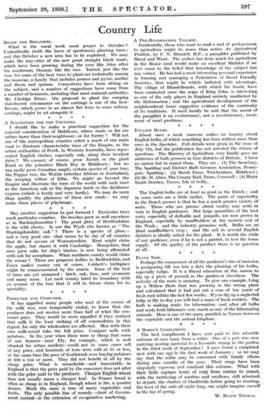PRODUCER AND CONSUMER.
It has appalled many people who read of the course of the milk war, now temporarily ended, to know that the producer does not receive more than half of what the con- sinner pays. They would be more appalled if t hey realized that milk is the least striking of all commodities in this regard, for only the wholesalers are affected. Men with their own milk-round take the full price. Compare milk with potatoes. In the year when these were so cheap that some of our farmers—near Ely, for example, which is well situated for urban markets—could not in some cases sell at any price, and hundreds of tons were sold at £1 or less, at the same time the poor of. Southwark were buying potatoes at £10 a ton or more. They did not benefit at all by the cheap price. What is remarkable—and lamentable—in England is that the price paid by the consumer does not alter with the price paid to the producer. Cheaper English wheat
does not usually mean a cheaper loaf. In • France bread is often as cheap as in England, though wheat is 10s. a quarter dearer. Much the same is true of many vegetables and fruits. The only possible line of remedy—short of Govern- ment control—is the extension of co-operative marketing.




































 Previous page
Previous page